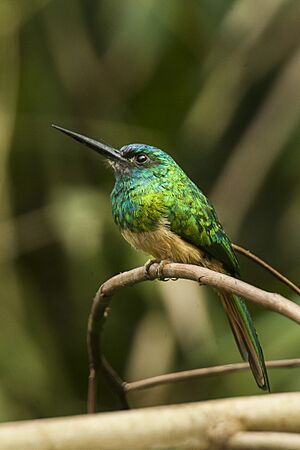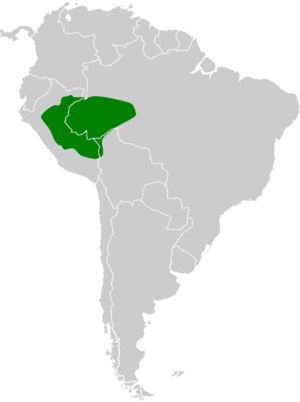Bluish-fronted jacamar facts for kids
Quick facts for kids Bluish-fronted jacamar |
|
|---|---|
 |
|
| Conservation status | |
| Scientific classification |
|
| Kingdom: | Animalia |
| Phylum: | Chordata |
| Class: | Aves |
| Order: | Piciformes |
| Family: | Galbulidae |
| Genus: | Galbula |
| Species: |
G. cyanescens
|
| Binomial name | |
| Galbula cyanescens Deville, 1849
|
|
 |
|
| Script error: The function "autoWithCaption" does not exist. | |
Script error: No such module "Check for conflicting parameters".
The bluish-fronted jacamar is a beautiful bird found in the rainforests of Bolivia, Brazil, and Peru. Its scientific name is Galbula cyanescens. This bird belongs to a family called Galbulidae, known for their bright colors and long beaks.
Contents
What is a Bluish-fronted Jacamar?
The bluish-fronted jacamar is a medium-sized bird. It grows to be about 20 to 23 centimeters (8 to 9 inches) long. It weighs around 22 to 26 grams (less than an ounce).
How to Spot a Bluish-fronted Jacamar
Male and female bluish-fronted jacamars look very similar.
- The top of their heads, including their forehead, is a shiny metallic green or bluish color.
- Their upper body is also metallic green with a blue shine.
- The chin and upper throat are dark, almost black.
- The lower throat and chest are green.
- The rest of their belly is a reddish-brown color.
The only difference is that females have a slightly more orange-brown color on their lower chest and belly.
Where Do Bluish-fronted Jacamars Live?
These birds live in South America, east of the Andes mountains. You can find them south of the Amazon River. They live in eastern Peru and western Brazil, reaching as far east as the Madeira River. They also live in the La Paz area of Bolivia.
What Kind of Home Do They Like?
Bluish-fronted jacamars prefer to live in humid forests. They like both old, untouched forests and newer forests that are growing back. They are often found near the edges of forests. You can especially spot them along riversides and near lakes. They usually live in areas up to 1,000 meters (about 3,300 feet) high.
How Do Bluish-fronted Jacamars Behave?
These birds have interesting ways of finding food and communicating.
What Do Bluish-fronted Jacamars Eat?
Bluish-fronted jacamars mainly eat flying insects. They sit on open branches or in bushes. When an insect flies by, they quickly fly out to catch it. Sometimes, they join groups of different bird species that are all looking for food together.
What Does a Bluish-fronted Jacamar Sound Like?
The song of the bluish-fronted jacamar is quite unique. It sounds like "kip kip-kip-kipkikikrkrkrrr-kree-kree-kree-kip-kip-kikikrrrrreeuw". You can often hear them singing in their forest homes.
Are Bluish-fronted Jacamars Safe?
The IUCN (International Union for Conservation of Nature) has looked at the bluish-fronted jacamar. They have decided that this bird is of "Least Concern." This means that there are plenty of these birds in the wild. They are common in their natural habitat. Many of them live in protected areas, which helps keep them safe.
 | James B. Knighten |
 | Azellia White |
 | Willa Brown |


